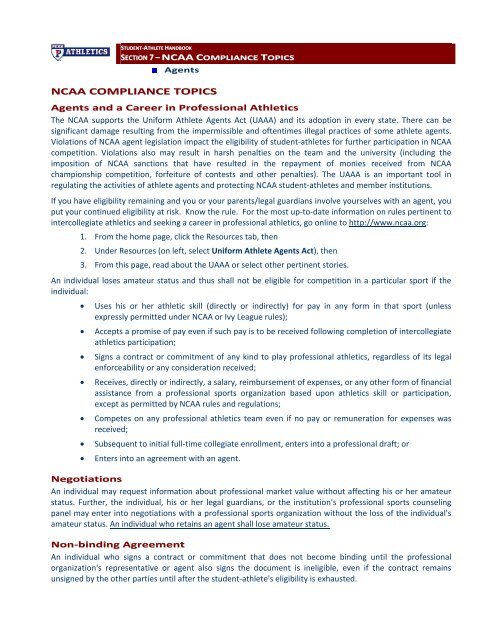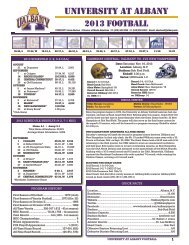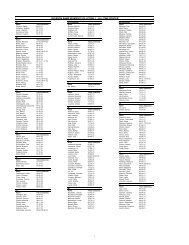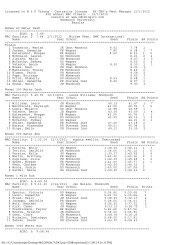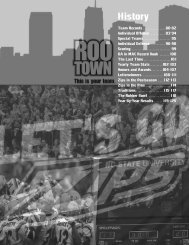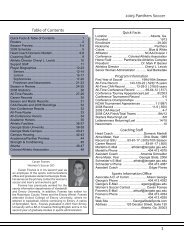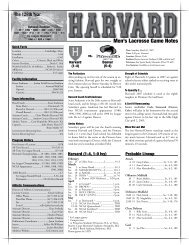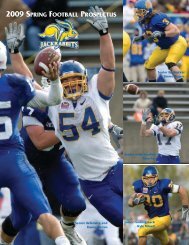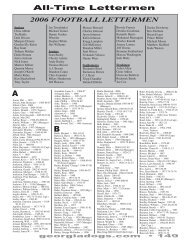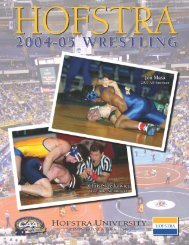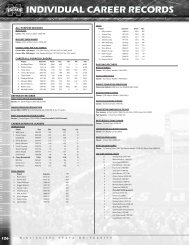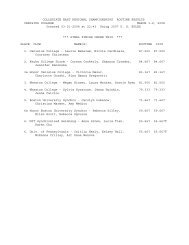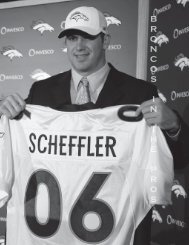NCAA COMPLIANCE TOPICS - Home Page Content Goes Here
NCAA COMPLIANCE TOPICS - Home Page Content Goes Here
NCAA COMPLIANCE TOPICS - Home Page Content Goes Here
You also want an ePaper? Increase the reach of your titles
YUMPU automatically turns print PDFs into web optimized ePapers that Google loves.
STUDENT‐ATHLETE HANDBOOK<br />
SECTION 7 – <strong>NCAA</strong> <strong>COMPLIANCE</strong> <strong>TOPICS</strong><br />
Agents<br />
<strong>NCAA</strong> <strong>COMPLIANCE</strong> <strong>TOPICS</strong><br />
Agents and a Career in Professional Athletics<br />
The <strong>NCAA</strong> supports the Uniform Athlete Agents Act (UAAA) and its adoption in every state. There can be<br />
significant damage resulting from the impermissible and oftentimes illegal practices of some athlete agents.<br />
Violations of <strong>NCAA</strong> agent legislation impact the eligibility of student‐athletes for further participation in <strong>NCAA</strong><br />
competition. Violations also may result in harsh penalties on the team and the university (including the<br />
imposition of <strong>NCAA</strong> sanctions that have resulted in the repayment of monies received from <strong>NCAA</strong><br />
championship competition, forfeiture of contests and other penalties). The UAAA is an important tool in<br />
regulating the activities of athlete agents and protecting <strong>NCAA</strong> student‐athletes and member institutions.<br />
If you have eligibility remaining and you or your parents/legal guardians involve yourselves with an agent, you<br />
put your continued eligibility at risk. Know the rule. For the most up‐to‐date information on rules pertinent to<br />
intercollegiate athletics and seeking a career in professional athletics, go online to http://www.ncaa.org:<br />
1. From the home page, click the Resources tab, then<br />
2. Under Resources (on left, select Uniform Athlete Agents Act), then<br />
3. From this page, read about the UAAA or select other pertinent stories.<br />
An individual loses amateur status and thus shall not be eligible for competition in a particular sport if the<br />
individual:<br />
Uses his or her athletic skill (directly or indirectly) for pay in any form in that sport (unless<br />
expressly permitted under <strong>NCAA</strong> or Ivy League rules);<br />
Accepts a promise of pay even if such pay is to be received following completion of intercollegiate<br />
athletics participation;<br />
Signs a contract or commitment of any kind to play professional athletics, regardless of its legal<br />
enforceability or any consideration received;<br />
Receives, directly or indirectly, a salary, reimbursement of expenses, or any other form of financial<br />
assistance from a professional sports organization based upon athletics skill or participation,<br />
except as permitted by <strong>NCAA</strong> rules and regulations;<br />
Competes on any professional athletics team even if no pay or remuneration for expenses was<br />
received;<br />
Subsequent to initial full‐time collegiate enrollment, enters into a professional draft; or<br />
Enters into an agreement with an agent.<br />
Negotiations<br />
An individual may request information about professional market value without affecting his or her amateur<br />
status. Further, the individual, his or her legal guardians, or the institution's professional sports counseling<br />
panel may enter into negotiations with a professional sports organization without the loss of the individual's<br />
amateur status. An individual who retains an agent shall lose amateur status.<br />
Non‐binding Agreement<br />
An individual who signs a contract or commitment that does not become binding until the professional<br />
organization's representative or agent also signs the document is ineligible, even if the contract remains<br />
unsigned by the other parties until after the student‐athlete's eligibility is exhausted.
General Rule<br />
An individual shall be ineligible for participation in an intercollegiate sport if he or she ever has agreed (orally<br />
or in writing) to be represented by an agent for the purpose of marketing his or her athletic ability or<br />
reputation in that sport. Further, an agency contract not specifically limited in writing to a sport or particular<br />
sports shall be deemed applicable to all sports, and the individual shall be ineligible to participate in any sport.<br />
Representation for Future Negotiations<br />
An individual shall be ineligible if he or she enters into a verbal or written agreement with an agent for<br />
representation in future professional sports negotiations that are to take place after the individual has<br />
completed his or her eligibility in that sport.<br />
Benefits from Prospective Agents<br />
An individual shall be ineligible if he or she (or his or her relatives or friends) accepts transportation or other<br />
benefits from:<br />
Any person who represents any individual in the marketing of his or her athletics ability. The<br />
receipt of such expenses constitutes compensation based on athletic skill and is an extra benefit<br />
not available to the student body in general; or<br />
An agent, even if the agent has indicated that he or she has no interest in representing the<br />
student‐athlete in the marketing of his or her athletic ability or reputation and does not represent<br />
individuals in the student‐athlete's sport.<br />
Legal Counsel<br />
Securing advice from a lawyer concerning a proposed professional sports contract shall not be considered<br />
contracting for representation by an agent under this rule, unless the lawyer also represents the individual in<br />
negotiations for such a contract.<br />
Presence of a Lawyer at Negotiations<br />
A lawyer may not be present during discussions of a contract offer with a professional organization or have<br />
any direct contact (i.e., in person, by telephone or by mail) with a professional sports organization on behalf of<br />
the individual. A lawyer's presence during such discussions is considered representation by an agent.<br />
STUDENT‐ATHLETE HANDBOOK<br />
SECTION 7 – <strong>NCAA</strong> <strong>COMPLIANCE</strong> <strong>TOPICS</strong><br />
Alcohol, Tobacco and Drugs<br />
ALCOHOL, TOBACCO AND DRUGS<br />
Alcohol<br />
The University of Pennsylvania does not condone the illegal or otherwise irresponsible use of alcohol. Alcohol<br />
abuse is a progressive disorder in which physical dependency can develop. The negative physical and mental<br />
effects of the abuse of alcohol are well documented. Even low doses of alcohol impair brain function,<br />
judgment, alertness, coordination, and reflexes. Very high doses cause suppression of respiration and death.<br />
Chronic alcohol abuse can produce dementia, sexual impotence, cirrhosis of the liver, and heart disease; and<br />
sudden withdrawal can produce severe anxiety, tremors, hallucinations, and life‐threatening convulsions.<br />
Therefore, it is the responsibility of every member of the University community to know the risks associated<br />
with alcohol use and abuse. This responsibility obligates students and employees to know relevant University<br />
policies and federal, state and local laws and to conduct themselves in accordance with these laws and<br />
policies.
Penn Athletics discourages the provision and consumption of alcohol at all athletic‐related events where<br />
students are present. Furthermore, departmental staff members must comply with the laws and policies of<br />
the state of Pennsylvania, the City of Philadelphia, and the University.<br />
University Funds, including gift funds, may not be used for the purchase of alcohol, which is to be<br />
provided to students.<br />
Alcohol may not be consumed on team buses, team vans or other methods of team<br />
transportation.<br />
The Ivy League discourages the abuse of alcohol and does not condone its possession or consumption by<br />
persons under the legal drinking age. Each member institution has adopted and implemented a program<br />
designed to prevent the abuse of alcohol by students, faculty and staff. The Ivy League fully supports each<br />
institution’s efforts and encourages each Department of Athletics to assist in these institutional efforts and to<br />
develop complementary departmental policies or guidelines. Alcoholic beverages should not be served or<br />
consumed in any activity related to athletics in circumstances that would result in violations of law or that<br />
serve to encourage their use by students.<br />
Tobacco<br />
The <strong>NCAA</strong> prohibits the use of tobacco products by all game personnel (e.g., coaches, trainers, managers and<br />
game officials) in all sports during practice and competition.<br />
The use of tobacco products by a student‐athlete is prohibited during practice and competition. A student‐<br />
athlete who uses tobacco products during a practice or competition shall be disqualified for the remainder of<br />
that practice or competition.<br />
Tobacco Ban ‐ No player, coach or game official may use any form of tobacco during practices or games in<br />
<strong>NCAA</strong>‐approved summer baseball leagues.<br />
The Ivy League discourages the use of tobacco products in all activities related to athletics.<br />
The distribution of smokeless tobacco product samples in Ivy locker rooms is prohibited.<br />
Drugs<br />
Penn prohibits the unlawful manufacture, distribution, dispensation, sale, possession or use of any drug by<br />
any of its employees in its workplace, on its premises or as part of any of its activities, or by its students. This<br />
policy is intended to supplement and not limit the provisions of University's Drug‐Free Workplace policy.<br />
<strong>NCAA</strong> Ineligibility for Use of Banned Drugs. A student‐athlete who is found to have utilized a substance on the<br />
list of banned substances (including performance‐enhancing substances as well as recreational drugs) shall be<br />
declared ineligible for further participation in postseason and regular‐season competition during the time<br />
period ending one calendar year after the student‐athlete's positive drug test, and shall be charged with the<br />
loss of a minimum of one season of competition in all sports. The student‐athlete shall remain ineligible until<br />
the student‐athlete retests negative and the student‐athlete's eligibility is restored by the <strong>NCAA</strong>.<br />
If the student‐athlete tests positive a second time for the use of any drug, other than a<br />
'recreational drug', he or she shall lose all remaining regular‐season and postseason eligibility in all<br />
sports.<br />
If the student‐athlete tests positive for the use of a 'recreational drug' after being restored to<br />
eligibility, he or she shall lose a minimum of one additional season of competition in all sports and<br />
also shall remain ineligible for regular‐season and postseason competition at least through the<br />
next calendar year.<br />
Know the rules, for the most up‐to‐date information on rules pertinent to <strong>NCAA</strong> Drug‐Testing go online to<br />
http://www.ncaa.org and search drug‐testing.
STUDENT‐ATHLETE HANDBOOK<br />
SECTION 7 – <strong>NCAA</strong> <strong>COMPLIANCE</strong> <strong>TOPICS</strong><br />
Student‐Athlete Employment<br />
EMPLOYMENT MPLOYMENT GUIDELINES<br />
EMPLOYMENT/JOB MPLOYMENT/JOB CHARACTERISTICS<br />
EMPLOYMENT MPLOYMENT MONITORING FORMS<br />
EMPLOYMENT MPLOYMENT IMPACT ON FINANCIAL AID<br />
STUDENT‐ATHLETE EMPLOYMENT<br />
SPORT PORT (ATHLETICALLY‐RELATED) EMPLOYMENT AUTHORIZATION<br />
FEE EE FOR LESSON EMPLOYMENT<br />
CAMPS/CLINIC AMPS/CLINIC EMPLOYMENT<br />
Employment Guidelines<br />
To ensure compliance with <strong>NCAA</strong> legislation and Penn Athletics policy pertaining to student‐athlete<br />
employment, each Penn student‐athlete is to review annually and comply with the employment guidelines<br />
listed below.<br />
I shall represent myself and my University by diligent work habits, honest communication, and<br />
respectful conduct toward my employer at all times.<br />
I will not accept any benefits or privileges that are not available to other employees doing similar<br />
work, including transportation provided or arranged by my employer to or from my place of<br />
employment.<br />
I understand that I must be paid by check (direct deposit or other method of payment that has<br />
been approved by DRIA Compliance) and will be paid only for actual hours worked and that<br />
compensation is at a rate commensurate with the rate of other employees doing similar work.<br />
I will report to the Penn Athletics Compliance office any improper privileges or benefits offered to<br />
me.<br />
I understand that a member of the Penn Athletics Compliance staff may contact my employer for<br />
ensuring <strong>NCAA</strong>, Ivy League, and Penn Athletics guidelines are being followed.<br />
I grant permission to my employer to release any and all employment records or documents to<br />
authorized Penn Athletics representatives.<br />
I understand that failure to abide by the above guidelines could seriously affect my athletic<br />
eligibility and financial aid.<br />
Employment/Job Characteristics<br />
It is permissible for student‐athletes to be employed during the academic year, provided the job has the<br />
following characteristics:<br />
• Job must be real.<br />
• Your hiring must comply with normal hiring practices of the employer.<br />
• Your compensation must be the same as that of others in the same position.<br />
• Your compensation must be unrelated to your athletics reputation or value.<br />
• Your compensation must be actual work done.<br />
As a student‐athlete, it is your responsibility to ensure that your employment during the academic year has<br />
these characteristics.
<strong>Here</strong> are some important points to remember concerning work opportunities:<br />
• Staff members, alumni or friends (of Penn Athletics) are not permitted to assist you in obtaining<br />
off‐campus (non‐University) employment during the academic year. You must obtain such<br />
employment on your own<br />
• We can help you find summer employment opportunities if compensation is at a standard rate of<br />
pay and you keep normal working hours.<br />
• Always check with your head coach or the Penn Athletics Compliance Office before committing<br />
yourself to any type of employment.<br />
• A violation may result in loss of your eligibility for competition, loss of your financial aid, and your<br />
sport being precluded from participation in national championships.<br />
Employment Monitoring Forms<br />
In an effort to alleviate misunderstandings of <strong>NCAA</strong> legislation surrounding employment by student‐athletes,<br />
all student‐athletes are required to complete an employment monitoring form (history of employment for<br />
prior year) as a condition of eligibility and a sport‐related employment approval form (for current academic<br />
year and summer) in PennEAI.<br />
• Employment Reporting Form (Penn eligibility requirement)<br />
• Employment Request/Change Form (required prior to beginning sport–related employment)<br />
Employment Impact on Financial Aid<br />
Earnings from a student‐athlete’s on‐ or off‐campus employment that occurs at any time are exempt and are<br />
not counted in determining a student‐athlete’s full grant‐in‐aid or in the institution’s financial aid limitations,<br />
provided:<br />
a. The student‐athlete’s compensation does not include any remuneration for value or utility that<br />
the student‐athlete may have for the employer due to the publicity, reputation, fame or personal<br />
following that he or she has obtained because of athletics ability;<br />
b. The student‐athlete is compensated only for work actually performed, and the student‐athlete is<br />
compensated at a rate commensurate with the going rate in that locality for similar services.<br />
Sport (Athletically‐Related) Employment<br />
Sport or athletically‐related employment requires prior authorization from the Penn Athletics Compliance<br />
Office.<br />
• Complete Employment Request form in PennEAI<br />
• Includes work in sport camps and clinics, and<br />
• Fee‐for Lesson Instruction<br />
Fee‐for‐Lesson Employment<br />
<strong>Here</strong> are some important points to remember when you arrange fee‐for‐lesson instructions:<br />
o Penn facilities may not be used.<br />
o Instruction may not include “playing lesson.”<br />
o You must document the name of the recipient of the lesson and the fee paid; copies of this<br />
documentation must be provided to the Penn Athletics Compliance Office.<br />
o The compensation must be paid by lesson recipient (or recipient’s family) and not another<br />
individual or entity.
o You may not conduct your own camp but you may give instruction to more than one recipient<br />
provided the instruction to each individual is comparable to the instruction that would be<br />
provided during a private lesson.<br />
o You may not use your name, picture or appearance to promote or advertise the availability of<br />
fee‐for‐lesson sessions.<br />
Camp/Clinic Employment<br />
General Rule ‐ All Sports<br />
A student‐athlete who is employed in any sports camp or clinic must meet the following requirements:<br />
o Compensation provided to the student‐athlete shall be commensurate with the going rate for<br />
camp or clinic counselors of like teaching ability and camp or clinic experience<br />
o Compensation may not be paid on the basis of<br />
the value that student‐athletes may have for the employer because of the athletic<br />
reputation or fame the student‐athlete or on<br />
the level of athletics skills of the student‐athlete<br />
o A student‐athlete may not engage in athletically‐related activities including team practices or<br />
conditioning sessions, except during the team’s declared playing and practice season<br />
o A student‐athlete who only lectures or demonstrates at a camp/clinic may not receive<br />
compensation for his or her appearance at the camp/clinic.<br />
EXTRA BENEFITS<br />
STUDENT‐ATHLETE HANDBOOK<br />
SECTION 7 – <strong>NCAA</strong> <strong>COMPLIANCE</strong> <strong>TOPICS</strong><br />
Extra Benefits /Preferential Treatment<br />
REPRESENTATIVES EPRESENTATIVES OF AATHLETICS THLETICS I INTERESTS NTERESTS ( (AKA AKA B BOOSTERS) OOSTERS )<br />
An extra benefit is any special arrangement by an institutional employee or a representative of Penn’s<br />
athletics interests to provide a student‐athlete or the student‐athlete’s relative or friend a benefit not<br />
expressly authorized by <strong>NCAA</strong> legislation. Receipt of a benefit by student‐athletes or their relatives or friends<br />
is not a violation of <strong>NCAA</strong> legislation if it is demonstrated that the same benefit is generally available to Penn<br />
students or their relatives or friends or to a particular segment of the student body (e.g., foreign students,<br />
minority students) determined on a basis unrelated to athletics ability.<br />
Below are “Extra Benefits” not permissible under <strong>NCAA</strong> rules.<br />
A special discount, payment arrangement or credit on a purchase (e.g., airline ticket, clothing) or a<br />
service (e.g. dry cleaning, laundry);<br />
A professional service without charge or at a reduced cost;<br />
The use of a telephone or credit card for personal reasons without charge or at a reduced rate;<br />
Services (e.g., movies tickets, dinners, use of car) from commercial agencies (e.g., movie theaters,<br />
restaurants, car dealers) without charge or at reduced rates;<br />
Free or reduced‐cost admission to professional athletic contests from professional sports<br />
organizations;<br />
A loan of money;<br />
A guarantee of bond;<br />
The use of an automobile;
Signing or co‐signing a note with an outside agency to arrange a loan;<br />
Preferential treatment, benefits or services (e.g., loans on a deferred payback basis) for your<br />
athletic reputation or skill or payback potential as a future professional athlete.<br />
FINANCIAL AID<br />
Check with Penn Athletics Compliance or your coach for additional restrictions.<br />
Remember, whenever in doubt about a gift, benefit, or service,<br />
CChheecckk iit it<br />
oouut t fi fiir<br />
rsst t!<br />
Any violation could result in loss of your eligibility.<br />
STUDENT‐ATHLETE HANDBOOK<br />
SECTION 7 – <strong>NCAA</strong> <strong>COMPLIANCE</strong> <strong>TOPICS</strong><br />
Financial Aid<br />
ASSISTANCE SSISTANCE F FUND UND /O /OPPORTUNITY PPORTUNITY FFUND<br />
UND<br />
Eligibility for Practice and Competition<br />
No student shall be eligible for practice and competition who has received financial support from any source<br />
except as noted below.<br />
from personal or family resources;<br />
in return for services (other than of an athletic character) rendered through employment at<br />
normal wages;<br />
from financial aid awarded by or with the specific approval of the regular academic authority of<br />
the institution in which the player is a student;<br />
from Government grants to war service veterans or regularly‐enrolled members of ROTC units.<br />
<strong>NCAA</strong> Financial Aid Limit<br />
The <strong>NCAA</strong> maximum financial aid limit for a student‐athlete is the cost of attendance. The cost of attendance<br />
is determined by Penn’s Office of Student Financial Services, and adherence to this limit is monitored by the<br />
Director of Student Financial Services and the Department of Intercollegiate Athletics Assistant Compliance<br />
Coordinator.<br />
In keeping with <strong>NCAA</strong> regulations outside financial aid for which athletic ability is a major criterion and<br />
educational expenses awarded by the U.S. Olympic Committee or a U.S. sport national governing body (or, for<br />
international student‐athletes, expenses awarded by the equivalent organization of a foreign country) may not<br />
exceed the value of a full grant‐in‐aid (aid based on athletic ability).<br />
Finally, to specify that a student‐athlete may receive any other financial aid unrelated to athletics ability up to<br />
cost of attendance; or the value of a full grant‐in‐aid plus a Federal Pell Grant, whichever is greater.<br />
The value of a full‐grant‐in‐aid is determined by the Office of Student Financial Services per <strong>NCAA</strong> policy.<br />
STUDENT‐ATHLETE ASSISTANCE FUND<br />
The Special Assistance Fund established from monies provided by the <strong>NCAA</strong> is administered by the Ivy League.<br />
Student‐athletes who are Pell Grant recipients or full‐aided international students who are not eligible to<br />
apply for a Pell Grant because of citizenship status may use this fund.<br />
Qualification for this fund is determined by the University's Office of Student Financial Services.<br />
In September, the Office of Student Financial Services informs the Department of Intercollegiate<br />
Athletics of qualified student‐athletes.
Qualifying student‐athletes are then informed by the Penn Athletics Compliance Coordinator by<br />
October 1 each year.<br />
If you believe that you qualify for the fund and have not been contacted by this date, please email<br />
an inquiry no later than December 1 to the Penn Athletics Compliance Office ‐<br />
athlcomp@pobox.upenn.edu.<br />
To receive reimbursement of permissible expenses, bring original receipts to Penn Athletics<br />
Compliance Office and complete an Ivy Group/<strong>NCAA</strong> Student‐Athlete Assistance Fund Request<br />
form.<br />
<strong>NCAA</strong> OPPORTUNITY FUND<br />
The <strong>NCAA</strong> Student‐Athlete Opportunity Fund became effective in June 2003. Monies from this fund may be<br />
used to pay expenses directly related to student‐athlete well‐being. Monies received by an individual student‐<br />
athlete are exempt from the individual or team grant‐in‐aid limitations. It is not permissible to use the fund<br />
for athletic enhancement, such as camp fees or for salaries or grants‐in‐aid (other than summer school),<br />
capital improvements and stipends. Contact the Penn Athletics Compliance Office for more information about<br />
this fund.<br />
STUDENT‐ATHLETE HANDBOOK<br />
SECTION 7 – <strong>NCAA</strong> <strong>COMPLIANCE</strong> <strong>TOPICS</strong><br />
Use of Student‐Athlete’s Name, Likeness or Image<br />
Modeling<br />
Promotional Activities<br />
PENN ENN ATHLETICS/IVY LEAGUE/<strong>NCAA</strong><br />
OTHER THER<br />
Sport Wagering<br />
USE OF STUDENT‐ATHLETE’S NAME, LIKENESS OR IMAGE<br />
Under <strong>NCAA</strong> rules it is impermissible for names, likenesses or images of student‐athletes to be used in the<br />
promotion of commercial products or entities. Likewise, a student‐athlete may not benefit from the use of his<br />
or her name, likeness or image used to promote or endorse a commercial product or entity.<br />
Modeling is most often discussed in reference to <strong>NCAA</strong> legislation addressing use of a student‐athlete’s name,<br />
likeness or image. Modeling can be hard to define in <strong>NCAA</strong> terms. However, we know it when we see.<br />
Engaging in a modeling activity does not in and of itself equate to promotion or endorsement of a product or<br />
entity. But regrettably, endorsement or promotion is most often implied. Either way, <strong>NCAA</strong> legislation serves<br />
to limit a student‐athlete’s participation in modeling and promotional activities.<br />
Participation in a modeling activity should be viewed similarly to employment. <strong>NCAA</strong> legislation prohibits<br />
student‐athletes from receiving employment and/or compensation (or benefits) based on athletic ability or<br />
reputation. This is applicable even when you are not being paid to model. As an athlete you are apt to have a<br />
body type that is favorable to modeling and are therefore likely to be approached for a modeling activity. In<br />
the advertisement industry, high‐profile professional athletes are highly paid to model for or endorse<br />
commercial products or entities. Collegiate athletes cannot be paid for their athletic reputation or ability.<br />
Pl leasse<br />
cchecck<br />
wi itth<br />
tthe Penn<br />
befforre you<br />
Atthl letti iccss Complli iancce Offffi icce<br />
al ll low usse off yourr<br />
NAME,, LIIKENESS OR IIMAGE
Modeling – General Rule: Impermissible Activity for Student‐Athletes<br />
<strong>NCAA</strong> legislation establishes rules and exceptions to those rules. So is the case with modeling – generally, it is<br />
impermissible for student‐athletes to engage in modeling activities (paid or unpaid). This means that if you<br />
model (without authorization), you jeopardize your eligibility to participate in Penn intercollegiate athletics.<br />
There are <strong>NCAA</strong>‐legislated exceptions that allow limited use of a student‐athlete’s name, likeness or image in<br />
promotional activities; thus, there are exceptions that will allow you to participation in some modeling<br />
activities.<br />
YOU WANT TO MODEL – KNOW THE RULES<br />
First, if you are seriously considering participating in a modeling activity, you should meet with a Penn<br />
Athletics Compliance staff member to discuss pertinent <strong>NCAA</strong> legislation. With regards to traditional<br />
modeling, there is legislation that allows (with conditions) a student‐athlete who was a model prior to college<br />
enrollment to continue to participate in modeling without jeopardizing his or her eligibility to participate in<br />
intercollegiate athletics. If you have not modeled prior to your college enrollment, your participation in<br />
modeling activities must be limited to legislated <strong>NCAA</strong> exceptions.<br />
Second, have a full discussion with the involved persons orchestrating the modeling activity. You need to<br />
know what will the modeling assignment involve; will photographs be taken and, if yes, how will they be used;<br />
where will they appear (print, website, etc). It is your responsibility to ensure that your name, likeness or<br />
image is used in a matter that is not impermissible under <strong>NCAA</strong> rules.<br />
Third, to ensure compliance with <strong>NCAA</strong> legislation, you should request and receive authorization to engage in<br />
the modeling activity from the Penn Athletics Compliance office.<br />
Promotional Activities<br />
You may participate in institutional, charitable, education or non‐profit promotions; however, the following<br />
conditions must be adhered to. To comply with (a) and (i) below, you must meet with a Penn Athletics<br />
Compliance staff member.<br />
(a) You MUST have written approval to participate from the director of athletics (or his or her<br />
designee, who cannot be a coaching staff member);<br />
(b) The specific activity or project in which you participate cannot involve co‐sponsorship,<br />
advertisement or promotion by a commercial agency other than through the reproduction of the<br />
sponsoring company's officially registered regular trademark or logo on printed materials such as<br />
pictures, posters or calendars. The company's emblem, name, address, telephone number and<br />
website address may be included with the trademark or logo. Personal names, messages and<br />
slogans (other than an officially registered trademark) are prohibited;<br />
(c) Your name or picture may not appear on an institution's printed promotional item (e.g., poster,<br />
calendar) that includes a reproduction of a product with which a commercial entity is associated if<br />
the commercial entity's officially registered regular trademark or logo also appears on the item;<br />
(d) You may not miss class;<br />
(e) All monies derived from the activity or project go directly to the member institution, member<br />
conference or the charitable, educational or nonprofit agency;<br />
(f) You may accept actual and necessary expenses from the member institution, member conference<br />
or the charitable, educational or nonprofit agency related to participation in such activity;<br />
(g) Your name, picture or appearance is not used to promote the commercial ventures of any<br />
nonprofit agency;<br />
(h) Any commercial items with names, likenesses or pictures of multiple student‐athletes (other than<br />
highlight films or media guides) may be sold only at the member institution at which the student‐<br />
athletes are enrolled, the institution's conference, institutionally controlled (owned and operated)
outlets or outlets controlled by the charitable, educational or nonprofit organization (e.g., location<br />
of the charitable or educational organization, site of charitable event during the event). Items that<br />
include an individual student‐athlete's name, picture or likeness (e.g., name on jersey, name or<br />
likeness on a bobble‐head doll), other than informational items (e.g., media guide, schedule cards,<br />
institutional publications), may not be sold; and<br />
(i) The student‐athlete and an authorized representative of the charitable, educational or<br />
nonprofit agency sign a release statement ensuring that the student‐athlete's name, image or<br />
appearance is used in a manner consistent with the requirements of this section.<br />
STUDENT‐ATHLETES INVOLVED IN STUDENT ORGANIZED ACTIVITIES<br />
You may participate in student organized activities that involve modeling provided your athletics reputation or<br />
ability is not considered in any manner in your selection for the activity and you have obtained authorization<br />
through the Penn Athletics Compliance Office. To repeat, your athletic reputation or ability may not be a<br />
factor in your selection for participation in a student group’s activity or promotion of the group. Therefore, it<br />
would not be an infraction of <strong>NCAA</strong> legislation for you to be a member of a student performing arts group or<br />
other student group or event such as a student‐run fashion show provided your name, likeness and image are<br />
not to be used in a matter impermissible under <strong>NCAA</strong> legislation. Any monies generated from the activity or<br />
event as well as photographs or merchandise produced in conjunction with the activity or event must be<br />
compliant with <strong>NCAA</strong> regulations. The student group’s president (or administrative head) must also agree that<br />
your name, likeness and image are not being used in a matter impermissible under <strong>NCAA</strong> legislation.<br />
To safeguard your eligibility, you should review your participation in non‐Penn athletics activities with a<br />
member of the Penn Athletics Compliance staff.<br />
STUDENT‐ATHLETE HANDBOOK<br />
SECTION 7 – <strong>NCAA</strong> <strong>COMPLIANCE</strong> <strong>TOPICS</strong><br />
Sport Wagering<br />
GAMBLING/SPORT WAGERING<br />
The <strong>NCAA</strong> views all infractions of the gambling/sport wagering rules to be serious. Penalties almost always<br />
include the loss of eligibility for involved student‐athletes. Is it worth your eligibility? Don’t Bet On It.<br />
<strong>NCAA</strong> rules prohibit student‐athletes from engaging in gambling activities as they relate to<br />
intercollegiate or professional sporting events.<br />
<strong>NCAA</strong> rules stipulate that student‐athletes shall not knowingly:<br />
o Provide information to individuals involved in organized gambling activities concerning<br />
intercollegiate athletics competition;<br />
o Solicit a bet on any intercollegiate team;<br />
o Accept a bet on any team representing the institution; or<br />
o Participate in any gambling activity that involves intercollegiate athletics or professional<br />
athletics, through a bookmaker, a parlay card or any other method employed by organized<br />
gambling.<br />
<strong>NCAA</strong> rules preclude a student‐athlete from soliciting or accepting a bet for a non‐monetary<br />
material item (e.g., shirt, dinner) that has tangible value.


